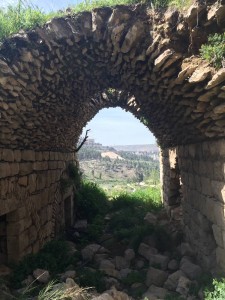A First-Timer’s Reflections on Israel
 I don’t have a handy quote to use as an epigram, but I’m sure that someone has previously, and pithily, expressed the idea that we travel as much to learn about ourselves as to learn about others. It’s the original form of comparative analysis, a chance to experience other ways of living and doing and thereby to reflect upon our own. The immediate effect is (often) the experience of novelty – at root the same thrill that accompanies exposure to a new idea, taste, or sound. “Here is something I haven’t seen before!” The lingering effect is that of evaluation, an effort to understand. We humans like to categorize, and so the urge is to place this new experience within our existing mental boxes. But the fit is not always perfect. When that happens we have to adjust the boxes, and thus our sense of the world. (Of course, there is a danger here, too. We might be so tempted to place things in our existing boxes that we overlook differences.)
I don’t have a handy quote to use as an epigram, but I’m sure that someone has previously, and pithily, expressed the idea that we travel as much to learn about ourselves as to learn about others. It’s the original form of comparative analysis, a chance to experience other ways of living and doing and thereby to reflect upon our own. The immediate effect is (often) the experience of novelty – at root the same thrill that accompanies exposure to a new idea, taste, or sound. “Here is something I haven’t seen before!” The lingering effect is that of evaluation, an effort to understand. We humans like to categorize, and so the urge is to place this new experience within our existing mental boxes. But the fit is not always perfect. When that happens we have to adjust the boxes, and thus our sense of the world. (Of course, there is a danger here, too. We might be so tempted to place things in our existing boxes that we overlook differences.)
Why the holding forth on travel? I will tell you. I had the opportunity to accompany Professor Andrea Schneider and the thirty-three students in her International Dispute Resolution class on their trip to Israel over Spring Break. It was an amazing trip. We encountered theory in the classroom, and the reality of conflict, borders, and displacement outside of it. The people who showed us these things, both the theoretical and the concrete, are themselves deeply immersed in the effort to achieve peace and mitigate the consequences of conflict. Even what might appear to have been the more conventionally touristy parts of the trip – typically involving some historically and/or religiously significant site –served to underscore just how layered and tangled the region’s issues are.

